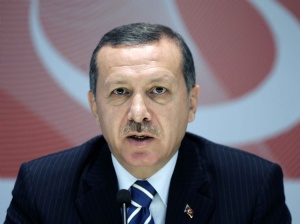
Turkish activism in Middle Eastern politics is received well by a majority of Arab leaders and the public, but linger remnants of old “anti-Turkish” sentiments nurtured during the British and French mandate regimes.
Observing Turkey's strong stance against Israel's operations in Gaza and the harsh language used by Turkish PM Recep Tayyip Erdoğan to criticize Israel, the Arab streets and intellectuals have started to question their perceptions of Turkey.
In the past Turkey was either perceived as a secular Westernized alien in the Middle East or the inheritor of an Ottoman legacy which aroused mixed feelings among Arabs. The Ottomans were, according to Arab perceptions, both the standard-bearers of Islam that kept the Muslim world united for 500 years and a foreign power that colonized Arab lands and usurped their natural and human resources.
This second perception was based mainly on the legacy of Cemal Paşa, who in his capacity as the governor general of Damascus and the commander of the Ottoman Fourth Army used brutal methods to suppress soaring Arab nationalism and separatism during World War I. Recent declarations by Prime Minister Erdoğan have, however, shifted the prototype of "The Turk" in the Arab Middle East from Cemal Paşa to that of a sincere and trustworthy Erdoğan.
Jordanian columnist Hamadeh Faraneh told Today's Zaman that Arabs in general and the Palestinians in particular perceived Turkey's stance during the recent Gaza carnage both with reverence and veneration. "Arabs were moved on two fronts: By the sensitivity the Turkish nation showed to the passion of the Palestinian people and by the historical and official stance of the Turkish government in the face of Israel and its readiness to help the Palestinian people, both materially and spiritually," he said. According to Faraneh, Turkey's new activism will reshape Arab feelings toward Turkey. "Today, Turkey overcame the memories of World War I. I can say that since World War I, Turkey's image in the Arab world has never been better. And when I say World War I, understand that I am referring to Cemal Paşa," he underlined.
A well-informed source from the Ministry of Foreign Affairs who joined Prime Minister Erdoğan during his recent diplomatic trip to the Arab capitals told Today's Zaman that he personally felt no Arab discomfort about Turkey's increased interest and activism in the Middle East. "In the past there was skepticism of Turkey's intentions in undertaking an active role in the Middle East. There was this obsession with the Ottoman past. Today they realize that Turkey is sincere in its efforts. They willingly come to and collaborate with Turkey. Turkey is not alone in running from one Arab capital to another. As recently as the last Gaza crisis, the Qatari prime minister and the Egyptian and Syrian foreign ministers came to Ankara. This shows the kind of trust Turkey has in the region," the Foreign Ministry source said. Another source in the Prime Ministry told Today's Zaman that contacts with Arab intellectuals and journalists attest to the fact that the Arab world is not only receptive to Turkey's role but also has a feeling of reverence toward Turkey and the Turkish prime minister.
Despite the positive feelings on Arab streets about Turkey's rising role as a peace-broker, skeptics who think that Turkey is trying to re-establish its role "over" the Arabs as a new Ottoman Empire or that Turkey is the tongs of Western powers who want to shape the Middle East from within are not absent. Arab TV channels broadcasted discussions where certain participants likened Erdoğan to Cemal Paşa. In fact, the appointment of Cemal Paşa to Damascus was perceived among nationalist Arabs as a chance to establish an independent unified Arab entity under Cemal Paşa. Though Cemal Paşa had never made such a promise to the Arab nationalists, articles suggesting so appeared in illegal newspapers run by separatists at the time. When Cemal Paşa had the leaders of Arab separatism executed in Beirut, the whole image of an Arab-loving Cemal turned into a black memory and fueled the hundred-year-old anti-Turkish feelings among nationalist Arabs.


